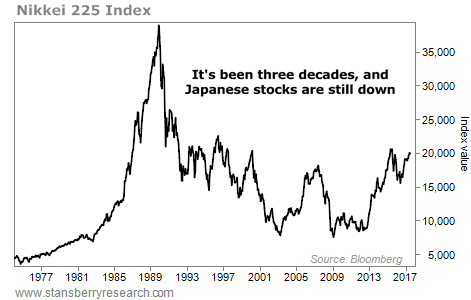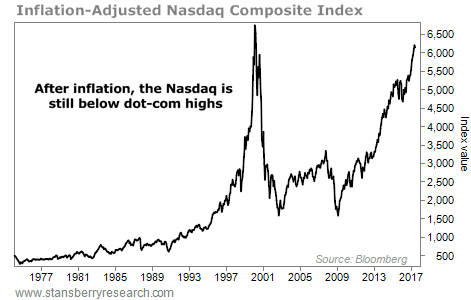Whoa! I couldn’t believe it when I read it!
It turns out, smart investors plan to keep owning their stocks – even when the likely outcome is losing money for a decade, or more…
Wow!
I guess the investing “establishment” has successfully bamboozled you and your fellow investors into believing that you ALWAYS need to be in the stock market.
At least, that’s what I took away on Tuesday when my friend, investment analyst Meb Faber, conducted a surprising pop quiz…
Meb is one of the smartest guys I know. Last week, he asked more than 1,000 of his customers – sophisticated investors – three questions in a quiz on Twitter.
Effectively, this is what he asked…
1. Do you currently own U.S. stocks?
2. If stocks were as expensive as they were at the peak in 1999, would you continue to own them?
3. If stocks were as expensive as they were at the world’s all-time peak (Japan in 1989), would you continue to own them?
I was shocked at the answers…
87% of his respondents said they own stocks today. That sounds right. His readers are sophisticated investors.
Then it got crazy…
Out of those who responded, 55% answered “yes” to question No. 2. And 33% said “yes” to question No. 3!
This is nuts!
Look, you don’t have to buy stocks. As Meb says, “You don’t have to play.” And history shows you don’t make any money over the next decade if you buy stocks when they’re extremely expensive.
Let’s look at the second and third questions a bit closer – starting with the more extreme question: No. 3…
Japan’s Nikkei 225 stock index peaked near 40,000 in 1989. It was more expensive than any world stock market in decades.
What has happened since 1989? Today – nearly 30 years later – Japan’s stock market is still down around 50% from its peak, sitting at around 20,000. Take a look:

Can you believe that one out of three investors said “yes” – they would keep owning stocks if the stocks became as expensive as they were in Japan in 1989? I can’t!
Let me rephrase the question, to help them land on the correct answer:
“The last time stocks were this expensive, you would have lost half your money over the next 30 years in stocks. So let me ask you again, would you buy stocks today if they were that expensive?”
Hopefully this time they’d say “no!”
Now let’s look at question No. 2 – whether you would buy when U.S. stocks were the most expensive they’ve ever been. (That was in late 1999 and early 2000.)
Here’s a chart of the Nasdaq Composite Index. (The chart is adjusted for inflation – but inflation wasn’t that big a deal over the last 20 years.)
If you had bought stocks at the peak nearly 20 years ago, where would you be today? Would you have made any money?
The Nasdaq peaked in early 2000. It’s now 2017 – and today, the Nasdaq is still below where it was 17 years ago (adjusted for inflation).

Hopefully, the message from these two charts is clear: You don’t have to always own stocks.
Sometimes, stocks are a great buy. I’ve been “pounding the table” for you to buy stocks for many years now. And I expect stocks will go even higher from today’s levels.
But they won’t go up forever. And at some point, when stocks get very expensive, the odds of you making money in stocks over the following decade get pretty bad. These two charts are proof.
“Remember, when Mr. Market shows up at your door, you don’t have to answer,” Meb concluded about his quiz.
I agree with him, 100%. Mutual-fund companies will tell you that you ALWAYS want to be invested in stocks, because you never know what the stock market will do.
Having some money in stocks is the right thing to do – most of the time. Heck, nearly all of the time. But there are rare occasions (like Japan in 1989 and the U.S. in late 1999) where the risk over the next 10 years is not worth the potential reward.
I expect when the current bull market finally peaks, we will be at that point. We’re not there yet, though.
Don’t be afraid to own stocks today. And when the peak arrives, don’t be afraid to dramatically cut back on your stock holdings – keeping these two charts (and decades of losses) in mind…
Good investing,
Steve
[ad#stansberry-ps]
Source: Daily Wealth



